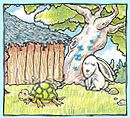Grammar: Sentence: Quoting and reporting speech and thoughts
| Reporting speech and thought |
Uses of indirect speech
Indirect speech may be used for stylistic reasons in writing. A text that uses only direct speech tends to be less interesting than one which employs both reporting and quoting. In other words, indirect speech adds variety to a text, as can be seen from the following fable:
|
One day the Hare was boasting
to the other animals that he could run very fast.
He laughed at the Tortoise and said:
"Look at your short legs. You are so
slow!" The Tortoise laughed with the others.
She knew that she was slow.
Then the Tortoise said: "Let's have a race. Even though you are as fast as the wind, I'll beat you." The Hare laughed out loud. "Impossible," he said, and he agreed that they should have a race. The Hare and the Tortoise asked the Fox to mark out the course and be the judge. |
|
|
|

|
The Hare and the Tortoise started the race together. The Hare sprinted way ahead, laughing to himself. When he was half way along the course, he felt hot and tired. "I think I'll have a rest," he said. "The Tortoise is so far behind she'll never catch up. Even if she does, I'll still beat her." The Hare lay down under a tree and fell asleep. |
|
|
|
Meanwhile the Tortoise never stopped for a moment. She
kept walking with slow and steady steps straight to the end of the course. When
the Hare woke up, the Tortoise was out of sight. He raced towards the finish
line as fast as he could. When he reached the end of the course, he saw the
Tortoise. She had crossed the line in front of him and was sleeping in the sun
while she waited.
Slow and steady wins the race. |
|
Although the role of direct speech is important, the more usual way of
representing what someone has said is to use indirect speech, ie reported
speech. We also generally use indirect speech to represent someone's
thoughts.
Indicating how a reported clause is to be interpreted
A reporting verb allows a speaker or writer to say how a reported clause is to be interpreted:
Inspector Fu apologised that he was late for his appointment. [apology]
Here the verb apologise tells us that what Inspector Wu said was intended as an apology. Here are some other examples where the reporting verb shows how a reported clause should be interpreted:
Dotty claimed that the book belonged to her. [claim]
The students complained that they didn't have enough time. [complaint]
Mr Wing ordered the delivery man to take the broken goods back. [command]
Mr Gong promised to take the children to the movies. [promise]
We generally choose a reporting verb that makes the function of the reporting clause explicit.
Not indicating the identity of the reporter
Indirect speech is sometimes used when the identity of a speaker or writer is not known, or when the reporter wants to conceal the identity of the speaker. In these cases the passive voice is used for the reporting clause, and the Doer is omitted:
It is said that a picture paints a thousand words.
It was alleged that Bozo had cheated in the test.
The children are claimed to be happy with the results.
For more information on the passive voice, see
![]() Grammar:
Groups & phrases: Verb group: Structure of the verb group: Voice: active and passive voice
Grammar:
Groups & phrases: Verb group: Structure of the verb group: Voice: active and passive voice
Note that the terms Question and Statement are written with an initial capital to remind us that they are functional terms.
Tell me more ... Structure of indirect speech |
|
||
To give us feedback about this section, click here or on the Comment button at the top of the screen.
If you have any questions about this section, visit the Language Corner.
If you have any questions or suggestions about how to teach this section, send a message to the Teaching Corner.